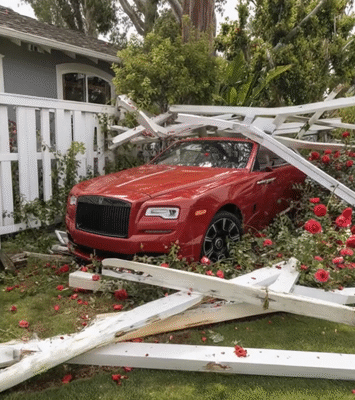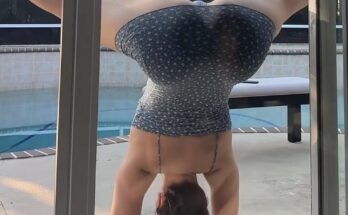For many years, I had lived quietly in my small home, a modest structure on a sleepy street where the only sounds were birdsong in the morning and the occasional rustle of leaves in the wind. My life had been shaped by loss:
my spouse, my parents, siblings, even close friends, all gone in a span of years that felt both too fast and painfully slow. Each loss carved away a part of me, and gradually, I built walls around my heart and my home.
I no longer invited anyone in; I no longer reached beyond the safe boundaries I had created. My yard, my garden, and the small rituals of daily life became my only companions.
I tended to my flowers, trimmed the hedges, and swept the porch with a meticulousness born of both habit and solitude. In my mind, peace meant invisibility, and I clung to that belief fiercely.
Then, one stormy evening, my carefully constructed world was disrupted. A car, reckless and hurried, mounted my driveway and collided with my fence. The wood splintered, paint peeled, and the debris scattered across my yard.
I rushed outside, my heart pounding, only to find the driver dismissive, shrugging as if the damage meant nothing. My voice caught in my throat, my words faltering.
It wasn’t just the fence that had been broken — it was the fragile sense of control I had over my little sanctuary. The indifference of the driver left me feeling unseen, unimportant, and strangely exposed.
That night, I sat in my living room, the room heavy with shadows, and for the first time in years, I allowed myself to feel the depth of my loneliness.
The next morning, the world seemed different. As I drew the blinds, sunlight spilled across the yard, illuminating something I hadn’t expected: the fence had been completely repaired, stronger and more beautiful than before.
Tiny garden lights glimmered along the edges of the flowerbeds, and in the corner, a small tea table had been set with careful precision. On one of the chairs rested an envelope, addressed to me in neat handwriting.
I opened it with trembling hands and discovered a short note, accompanied by money. The note was simple: a message of kindness, generosity, and quiet understanding. It said: “We noticed what happened.
We wanted to help. Please enjoy this little gift. – A Neighbor.”
I sank onto the freshly repaired steps, clutching the envelope. My chest ached, not from sadness, but from a mixture of surprise and gratitude.
For so long, I had believed that the world had moved on without me, that my existence was invisible.
And yet here was a stranger — someone who had acted without expectation or recognition — reminding me that kindness still existed, even in quiet corners of the world.
By mid-morning, a pair of postal officers arrived at my doorstep. I assumed it was routine, perhaps to follow up on the incident. Instead, they brought news that left me stunned.
My neighbor, who lived next door, had witnessed the accident, or at least part of it, and had inadvertently recorded it while tending to his yard.
Understanding the pain and inconvenience the incident had caused, he had not only ensured the responsible driver paid for the damages but had also personally supervised the restoration of my fence.
The repairs, the lights, the tea table, and the note had all been his quiet initiative — an act of generosity done with no audience, no fanfare, and no expectation of recognition.
Tears pricked my eyes as I absorbed this reality. For years, I had felt unseen, unappreciated, and untethered from the world around me. And now, in a single morning, I felt both noticed and valued.
I realized that while my life had been marked by loss and solitude, it was not devoid of connection.
Small acts of empathy, as simple as a repaired fence and a few glowing lights, could ripple outward, touching hearts in ways I had long thought impossible.
The following day, I finally summoned the courage to visit my neighbor in person. His young son was with him, a bright, curious child who had helped choose the lights for my garden.
We exchanged polite words at first, but gradually, the conversation unfolded into something warmer and more genuine.
I shared small pieces of my life, the grief that had defined so many years, and the quiet rituals I had clung to in order to survive. In turn, my neighbor shared stories of his family, his work, and the small joys and struggles of their daily life.
We laughed together, awkwardly at first, then with a warmth that filled the spaces long vacant in my heart.
Over the weeks that followed, our interactions became more frequent and more meaningful. The child’s laughter rang through my yard as we played small games, and I began to look forward to their visits.
The tiny tea table, once a symbol of unexpected generosity, became a place for quiet conversation, reflection, and shared moments of joy. I began to allow myself to participate in life again — not fully, not all at once, but incrementally.
I watered my garden with renewed care, not just as a solitary task, but as a shared ritual. I invited conversation, offered tea, and allowed the presence of others to transform the silence that had once been my only companion.
As the days turned into months, I noticed subtle but profound changes in myself. The fences I had built around my heart — not just the physical one in my yard, but the invisible barriers around my spirit — began to soften.
I laughed more freely. I allowed myself to feel emotions I had long suppressed. I even began to see beauty in the ordinary, the mundane, and the fleeting — a sunrise, a bird landing on the fence, the laughter of a child.
I realized that life, even after decades of isolation, could offer unexpected joys. I learned that a single act of kindness could create a cascade of connection, rippling through days and weeks, slowly reshaping a life once thought closed off.
Years later, when I look back on that broken fence and the morning it was repaired, I see more than wood and nails. I see a doorway — a threshold that led me back into the world, back into relationships, and back into the practice of hope.
I see proof that life, even in later years, can surprise you with moments of beauty, generosity, and connection.
The neighbor who acted quietly, the child whose laughter brought music to my garden, and the lights that shimmered along the fence all serve as reminders: even in solitude, life has a way of opening doors, and even in loss, the heart can find its way back to joy.
I now understand that the broken fence was never just a physical barrier. It was a metaphor for the walls we build around ourselves, the isolation we cling to in fear or grief, and the unexpected ways that kindness can tear them down.
That single incident reminded me that even after years of pain, solitude, and grief, the world still contains beauty, connection, and generosity — and that life, in all its quiet forms, is worth participating in again.



